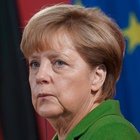President of Russia Vladimir Putin: Good afternoon, ladies and gentlemen,
I would like to begin by thanking the Federal Chancellor for coming to Sochi and for the opportunity to have a meaningful conversation on preparations for the upcoming July G20 meeting in Hamburg, and review urgent matters on the bilateral agenda, as well as exchange views on current international issues, including the Syria crisis and the situation in Ukraine.
First, I would like to note that Russia seeks to promote mutually beneficial cooperation with the Federal Republic of Germany based on the principles of respect, equality and consideration of each other’s interests.
Despite the well-known political challenges and fluctuations in the global economic situation, the Federal Republic of Germany remains one of Russia’s leading foreign trade partners. In terms of bilateral trade, we were pleased to note that trade has started to grow. In fact, bilateral trade surged by 43 percent in January–February 2017.
We also noted that Germany is a major destination for Russia’s natural gas exports, since Russian gas accounts for 35 percent of Germany’s market.
Germany is the number one investor in the Russian economy with investment exceeding $16 billion. German businesses benefit from all the opportunities and privileges available for working on the Russian market. There are about five thousand companies with German capital in Russia with a total turnover of more than $50 billion.
It is encouraging that the Russian-German Strategic Working Group on Economic and Financial Cooperation has resumed its work recently. It was designed to resolve specific issues for streamlining business-to-business ties and helping companies implement major joint projects.
We hope that this year German businesses will play a more prominent role at the St Petersburg International Economic Forum.
During the talks, we naturally raised the issues of deeper humanitarian cooperation, developing academic contacts and cultural ties. However, we paid the most attention to the international agenda.
As for preparations for the forthcoming G20 summit, we will discuss them in detail at our working breakfast immediately after this meeting, ladies and gentlemen.
Allow me to stress that Russia and Germany cooperate productively within the framework of the G20, particularly in combating the financing of terrorism, money laundering, tax evasion and corruption.
Russia is ready to provide the German presidency with all the necessary assistance and help to ensure that the summit in Hamburg is fruitful, adopting conceptual and consensual decisions on most acute problems of the world economy and finance.
At a recent restricted format meeting, as I already said, we spoke about the situation in Ukraine, which causes serious concern.
Ms Merkel and I always keep in touch, just as with the other Normandy format participants. As you may know, we had a telephone conversation on April 17.
The Normandy Four, undoubtedly, should continue dealing with the Ukrainian crisis. That is, our work in this format will continue after the presidential election in France, as we agreed during the latest telephone conversation.
Today we have reaffirmed the need for the parties to strictly observe the Minsk Agreements. We agreed to focus, among other tasks, on separating the forces and assets of the parties to the conflict, which should completely stop the attacks, establish a direct dialogue between Kiev and the unrecognised republics, legislatively formalise the special status of these regions and hold elections there on the basis of such legislation.
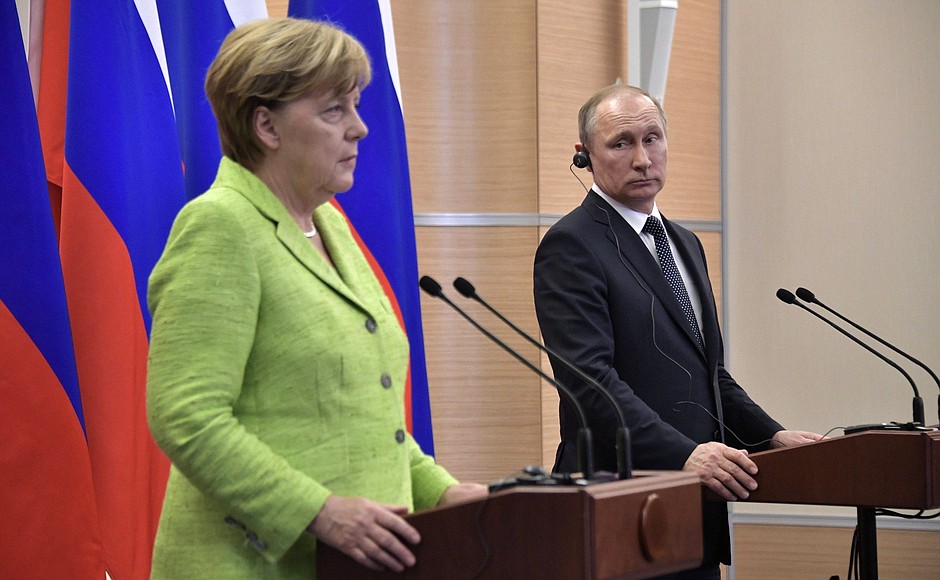
We believe the OSCE special monitoring mission undoubtedly plays a stabilising role in the conflict zone. Tragic incidents like the recent explosion of an OSCE vehicle, without a doubt, cause significant harm to the peacemaking efforts and lead to further escalation of tensions. Therefore, an impartial investigation into what happened is necessary.
As you may recall – and I am compelled to mention this – three years ago today, a horrible tragedy took place in Odessa, when Ukrainian nationalists forced helpless people into the Trade Union House and burned them alive. To this day, the guilty have not been prosecuted and punished. The global community does not have the right either to forget about it, or to allow similar barbaric crimes to happen in the future.
We also exchanged opinions on the current situation in Syria and spoke for energising the negotiations within the Astana and Geneva formats. We believe that a solution to the Syrian issue can only be found by peaceful means and under the aegis of the United Nations.
Russia has drawn attention to the need for a thorough and comprehensive investigation into the incident of April 4 in Khan Shaykhun. We strongly condemn any use of chemical weapons. Those guilty of killing Syrian civilians must be found and punished, no question about that. However, a thorough and impartial investigation is required.
Ladies and gentlemen, I would like to note that my talks with Ms Merkel are always based on mutual interest, openness and constructiveness.
Over the decades since WWII, Russia and Germany have travelled a long and difficult path of convergence. Our common task is to not lose the experience we have accumulated, and to develop bilateral cooperation for the benefit of our peoples, in the name of peace and security in Europe.
Thank you.
Federal Chancellor of the Federal Republic of Germany Angela Merkel (retranslated): Thank you very much.
I also think that this is a very good opportunity to hold these talks, so I thank you for the invitation to come to Sochi.
We have already had an intensive first part of the talks, so I believe that during the second part we will focus more on our German presidency in the G20, along with other issues.
Many thanks to Russia for acting as a constructive partner in making the G20 summit in Hamburg possible. We have developed a comprehensive agenda, and global events show that what we need is multilateral cooperation that benefits everyone, and we will continue to work in that spirit.
We started our talks by discussing bilateral issues. We also noted progress in economic cooperation. Of course, I would like us to lift the sanctions upon implementation of the Minsk agreements.
There is a connection, of course. Nonetheless, we are developing bilateral contacts within the framework of the economy, youth exchanges and science. In a week, we will mark the 72nd anniversary of the end of World War II. I would like to remind you about this.
Two years ago, I was in Moscow on the occasion of the 70th anniversary of the end of World War II. I would like to pay tribute to the memory of those who died in that war. We must not forget about this. We must remain guided by this spirit.
I would also like to thank the Russian Federation and the President for making sure that taking care of the military graves of the German soldiers who died in the Soviet Union is a matter of course. This is very important for the people affected by World War II.
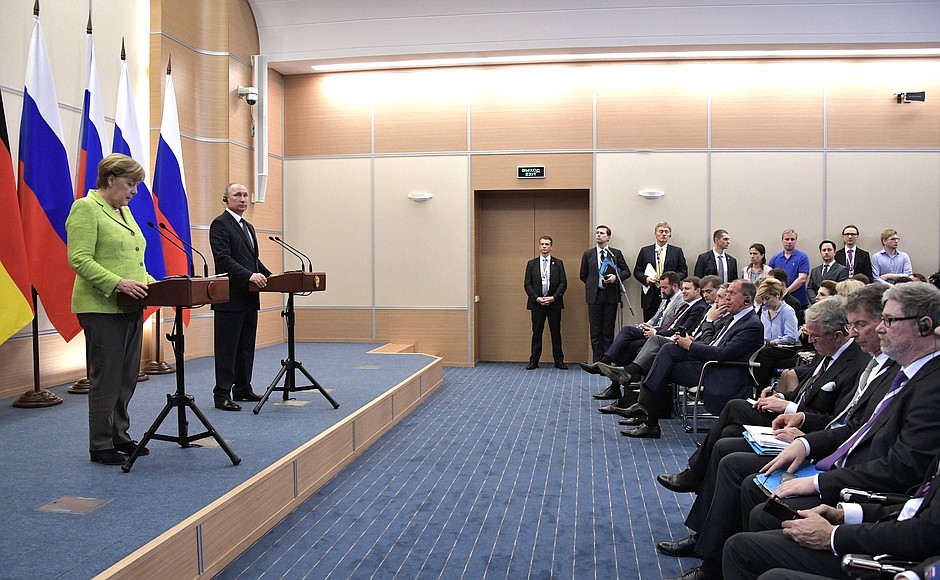
We also noted progress made by the Petersburg Dialogue, which has already become a forum where various critical issues are discussed openly. It is important for me that our civil societies maintain exchanges despite their different positions.
In this regard, we also noted and talked about the possibilities of civil society in Russia. I touched on the subject of the German-Russian House in Kaliningrad. I believe we managed to find a solution to this issue, and we will be able to resolve it.
I once again noted the importance of observing the right to assembly and of non-governmental organisations to work freely. I also said that we received negative reports about what is happening with homosexuals in Chechnya, and I asked the President to use his influence to protect the rights of minorities. The same applies to Jehovah's Witnesses.
We also discussed the international agenda. Our latest telephone conversation in the Normandy format was very important. We agreed to continue this format following the presidential election. This is a very difficult process.
Sometimes we see backsliding and our progress is slow. And, of course, the work of OSCE observers is very important. It is especially sad and horrible when people who advocate the de-escalation of conflicts become the victims of these conflicts. We must make every effort to solve this problem.
Unfortunately, there has not been much progress, and we have to continuously remind of the starting point of the Minsk agreements, about the need for a truce, after which come the political steps. We have begun working on parallel tracks, but of course, the truce is of great importance for subsequent developments, as are prisoner exchanges and the political process we agreed on in Minsk.
On behalf of the Federal Republic of Germany and the Foreign Minister, I can say that we will make every effort to make progress, despite all the difficulties.
We also spoke about the situation in Syria. As Federal Chancellor, I noted that we want to do everything possible to support a truce, a ceasefire, and to help people there. I believe this is the approach that should be continued.
I think we can also discuss the situation in Libya. We are united when it comes to the fight against international terrorism, and Germany and Russia can cooperate more closely here. Germany, as part of the anti-ISIS coalition, makes its contribution to combating international terrorism. And we have the same stance on this issue.
We have held very substantial talks and will be able to continue them following this news conference. I think there are different opinions, but international politics means that we must seek and find dialogue.
Particularly in light of the upcoming 72nd anniversary of the end of WWII, we must do everything in our power to bring peace to the world.
Question: Madam Federal Chancellor, you spoke about Ukraine. Is it not more realistic to consider a new agreement, because de facto the separation of the territories controlled by the separatists is moving forward on the ground – suffice it to mention the introduction of passports and the ruble? What do you think about sending UN observers there?
And Mr President, a lot of people from the opposition have been detained in recent weeks in Russia. Why is the leadership so harsh on these opposition activists, and what can you do to end this?
Angela Merkel: I do not think it is advisable to enter into new agreements. I am also displeased that we are seeing stronger and stronger trends toward separation: expropriation of enterprises, a transport blockade and other issues. We must study these matters very carefully and do everything possible to reverse course. Of course, all this is connected with the slow political process directed at achieving a future settlement.
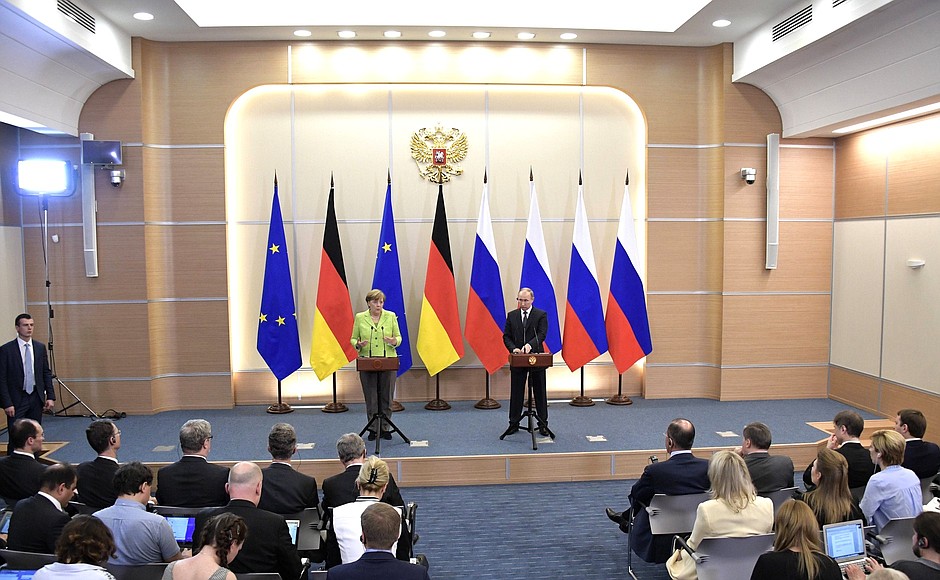
Of course, we want to ensure that Ukraine gets access to its state border, which is also part of the Minsk Agreements, and then to ensure political solutions that will allow local elections to be held. We have not achieved this yet.
However, this does not mean that we can simply forget about the existing agreement and must move toward concluding a new agreement. That is to say, the issue is not that of a new agreement, but implementing the provisions of this agreement. And this is the key to solving the problem.
My strong request to the Russian President is to do everything possible to ensure a truce, because only then will we have the prerequisites for solving the existing problems, including the status of this region.
As for sending UN observers, we spoke about this. However, we are in agreement that the work of the OSCE representatives is very important. I want to specifically reassure the OSCE representatives – they must receive significant support from us. It does not make sense here to look for other formats that will not be of much use.
Vladimir Putin: Let me begin with the first part of your question. Thank you for both the first part and the second part. I hope that out of respect for your readers, listeners, and viewers, you will do your best to convey as accurately as possible what I say when answering the first and second parts.
First, regarding the events in southeastern Ukraine – this is the result of a coup, an unconstitutional change of power in Kiev.
Secondly, no one has separated these territories; they are being separated by the Ukrainian authorities themselves, which set up all kinds of blockades. I draw your attention to the fact that Russia is still supplying a significant amount of goods, including energy, and coking coal for the Ukrainian metallurgical industry.
However, the Ukrainian authorities are the ones responsible for the blockade of these territories. No one introduced the ruble as an alternative currency. It is that the Kiev authorities have essentially withdrawn the national currency of Ukraine – the hryvnia – from circulation, and people in these republics, these territories, had no other choice but to introduce alternatives.
They announced that almost all currencies, including the Russian ruble, can circulate there, but given the special economic links, the ruble certainly dominates the currency market there.
Now, with regard to privatisation, or rather the nationalisation of enterprises, the seizure of enterprises. No one seized these enterprises from their legitimate owners. But since these enterprises, which are located on the territory of the unrecognised republics, have been denied the ability – and I want to emphasise this – to obtain raw materials from Ukrainian territory, or ship products to Ukrainian territory, people who work at these enterprises – so as not to be left without the means to survive – had no choice but to introduce temporary management. I want your readers, viewers and listeners to know about this. No one took anything away from anyone.
Finally, how can these enterprises exist if they are completely deprived of the opportunity to receive at least something for their economic activities, since the Kiev authorities have cut off all financial ties with this territory? Banks do not operate there, and the Ukrainian financial system does not operate there on the initiative of the current Kiev authorities.
Our partners in Europe said some time ago that they are ready to help the Ukrainian authorities to ensure the normal functioning of financial institutions, at least temporary ones. Unfortunately, our partners in Kiev have done everything possible to prevent these wishes and plans of our European partners from being implemented. Therefore, everything happening there is forced measures.
I agree with the Federal Chancellor that we cannot and should not come up with any alternative to the Normandy format and the Minsk Agreements, because new plans cannot be devised until basic results have been achieved on what we mapped out in past years.
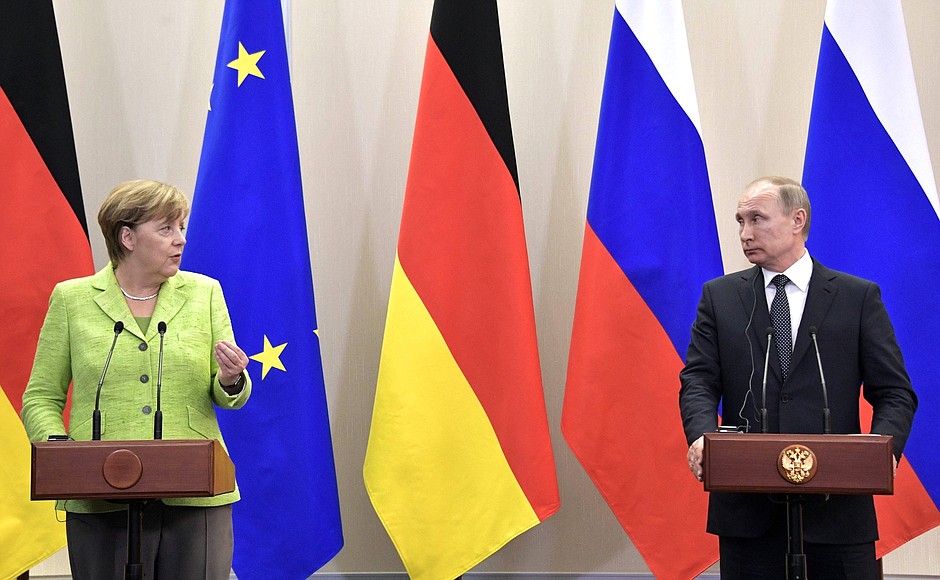
As regards the OSCE, I have already mentioned this in my opening remarks: the OSCE plays an extremely important role and it is necessary to do everything possible to ensure that the OSCE can do its work.
Now as regards protest actions in Russia and the conduct of our bodies of authority, I discussed this with the Federal Chancellor. I drew her attention, and want to draw your attention, to the fact that Russian law enforcement agencies are far more restrained and lenient in their conduct than their colleagues in some European countries, where tear gas and batons are used against demonstrators. We have no need for that so far, thank God.
Our law enforcement and judicial bodies are acting within the confines of existing Russian law and will continue to do so in the future, observing proper procedure and discipline as well as the right of all Russian citizens to express their point of view, but, I repeat, within the confines of the law.
Question: Mr President, Madam Chancellor, in your opening remarks, you already mentioned the Normandy format, that it will continue its work after the new President of France is elected. But there are serious doubts about its effectiveness, because there have been no results. The Minsk Agreements are lagging (as you said yourself).
Could you assess how effective this format is? Perhaps some efforts are required to revive it. What needs to be done, in your opinion, so that it could finally start working properly?
Vladimir Putin: This format works. If we did not have it, things would be much worse than they are now. This is a result, and an important result, I can assure you.
But what more has to be done? Ultimately, we have to get representatives of the Kiev authorities and representatives of these unrecognised republics to meet for talks. The conflict cannot be resolved without direct dialogue between the parties to the conflict; it has never happened any other way in the world. I hope this is achieved someday.
Of course, we have to be consistent in implementing existing agreements. I will not go into detail, but when we last met in this format in Berlin, we spoke and argued about this at length, and our positions no doubt differ on certain points.
I am absolutely convinced that the current Kiev authorities quite possibly missed the chance to implement the Minsk Agreements at a moment when they had significant domestic political opportunities. Now there are fewer – the opportunities at the highest levels of government are much more limited now due to a whole range of circumstances, including the economic and domestic political situation.
Yet, we must continue our efforts in the Normandy format, within the Minsk Agreements. I will reiterate: no new plans can be made without implementing the previous ones.
Angela Merkel: We have different views on the causes of this conflict, we do not share this point of view, and we believe that the Ukrainian government came to power through democratic means and the President now has the responsibility to implement the Minsk Agreements.
Despite this, we have agreed to continue using this format to prevent further escalation. Of course, we are not satisfied with the implementation of the Minsk Agreements, but we are engaged in a process that is preventing the situation from deteriorating.
Before we founded the Normandy format, many people had been killed, and sadly, they are still being killed. Based on the talks I had with the Ukrainian side, I know that they also feel committed to the implementation of these agreements. We are conducting our dialogue directly through the Contact Group.
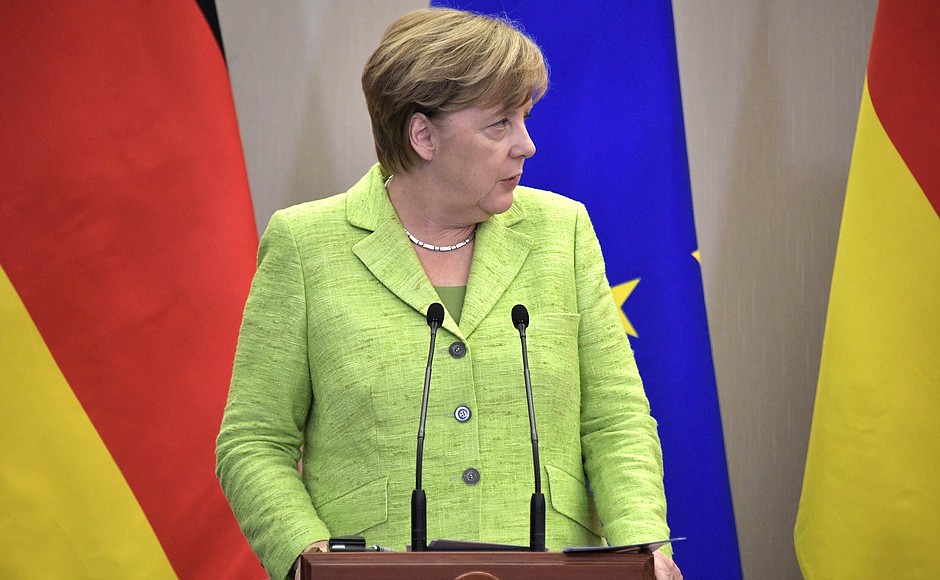
The step we have to take is to create a situation that would allow us to ensure that there is legitimate leadership on the territories of Lugansk and Donetsk. Here, a road map is needed, and certain efforts are required. The programme is already on the table, and we have to continue working on this programme.
Question: Madam Federal Chancellor, there are accusations that Russia influenced the election campaign in the US by manipulating public opinion. Can you be sure that Russia will not interfere in the election campaign in Germany?
Mr President, you are considered the person who has the most influence with Bashar al-Assad. Is your influence with him as significant as they say? Or is your interest in winding down this horrible war not that great? Are you prepared to support security zones in Syria?
Angela Merkel: I cannot say anything about the US presidential campaign. I am not afraid. If there is clear disinformation, as in the case of the girl Liza or in Lithuania now, where certain accusations have been made against our soldiers, we will, of course, handle it, and work with our citizens.
We know that cybercrime is an international threat; you can read about it anywhere. And, of course, hybrid warfare plays a certain role in Russia’s military doctrine. However, I am confident that we will hold the election campaign by ourselves, with all the different positions in our political arena represented.
Vladimir Putin: We never interfere in the political affairs or the political processes of other countries. And we certainly do not want anyone to interfere in Russia’s political affairs either.
Unfortunately, we are witnessing the opposite: for many years, we have seen attempts to influence Russia’s domestic politics, both through so-called non-governmental organisations, and directly.
While recognising the harm of such attempts (as well as their futility), we have never thought about interfering in the political processes of other countries. This is the first thing I would like to say.
My second point. You mentioned the US and allegations that have never been confirmed. It is just rumours used in the internal political struggle in the US. And you are making assumptions regarding European countries, including a friendly country like Germany. I find this strange.
Finally, Syria. President al-Assad is mostly influenced by the Syrian people. The people are quite obviously divided and we are seeing big problems within Syrian society.
Our goal is to create conditions for unification, for the cessation of hostilities, for ending the mutual destruction and for political cooperation between all parties to the conflict.
What might these conditions be? First, a ceasefire. We achieved it with our Turkish and Iranian partners within the framework of the Astana process. We believe the ceasefire regime should be consolidated. In fact, our representatives in Astana will work on this tomorrow and the day after tomorrow together with the Syrian parties to the conflict. We will also maintain contact within the framework of the negotiating process in Geneva.
Needless to say, it is also impossible to resolve these problems without the participation of the United States. Therefore, we are, and will continue to be, in contact with our American partners.
I hope we will achieve understanding there concerning joint steps in this very important and sensitive area of global politics today.
Question: Good afternoon, I have a question for both leaders. To all appearances – in fact, you have said it yourselves – you have focused on international issues. Perhaps my question will sound a little crude but are our bilateral relationships still alive? Do they have a future? Or do you only deal with crises?
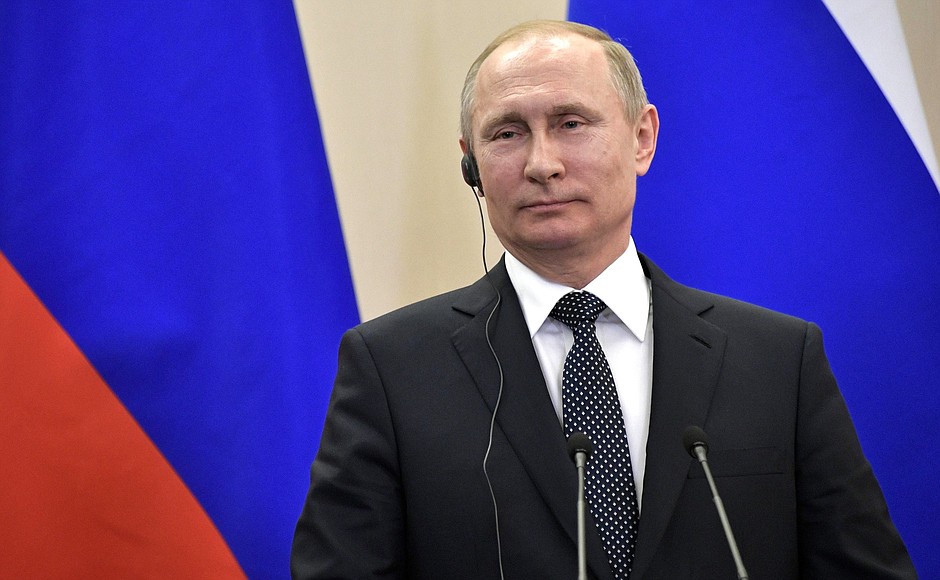
The G20 summit– where you will soon meet – traditionally addresses economic issues. There are still a lot of economic problems in the world. If there are some positive developments in Russian-German relations, maybe we could jointly contribute to improving the global economic situation?
Vladimir Putin: I already said in my opening remarks that Germany is Russia’s second biggest trading partner, after China. This represents a great deal of mutual interests. Germany is in the top position in terms of investment in the Russian economy: over $16 billion.
Incidentally, Russian investors have also invested a significant amount in the German economy: over $8 billion. Our cooperation maintains dozens if not hundreds of thousands of jobs in Germany and in Russia.
Our cooperation is not a myth, not some paper signed by myself or the Federal Chancellor. The fates of enterprises and hundreds of thousands of people are behind it. And of course, our cooperation makes a substantial contribution to global economic stabilisation.
Are there any prospects? Of course, there are. As I have said, January-February saw a 43 percent increase in trade between Russia and Germany. This is a very good indicator.
Yes, there are still a lot of problems; yes, there are still a lot of impediments, but this is precisely what we are going to discuss within the framework of the G20 negotiating process proposed by Germany, and beyond it.
See also
The focus will most certainly be on what further action can and should be taken to eliminate impediments to global economic development.
I hope the G20 platform, on which Germany is currently working, will help us in this regard.
Angela Merkel: I share this view, despite the existing differences.
The President drew attention to the way economic relations are developing, and there are also long-standing ties in science and research, but people-to-people contacts are very important.
Young German students are studying in Russia and people from Russia are studying in Germany; there are youth exchange programmes, which are working very well. Despite our differences on political issues, we should support these youth exchanges.
I would like once again to draw your attention to the Petersburg Dialogue. There was a dramatic discussion in Germany as to whether we should invest in expanding the Petersburg Dialogue. Former foreign minister Frank-Walter Steinmeier and I said the Petersburg Dialogue should move forward despite the fact that sometimes there are highly emotional discussions, because without this kind of dialogue we will eventually end up in silence and with less mutual understanding.
Of course, the process is rough going; sometimes we discuss the same topics, marking time. There are issues that can be described in three words, for example, the Steinmeier formula.
Nevertheless, we should always make efforts to maintain dialogue. When we talk to each other, we understand each other better. If we look at our centuries-old history, we should understand that we need to always maintain dialogue because every conversation, every discussion teaches us something.
